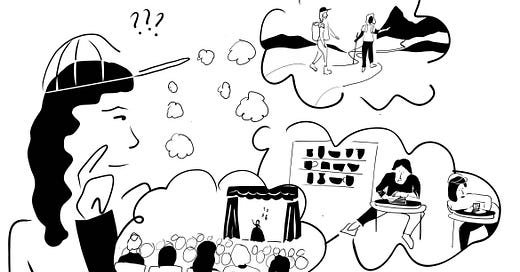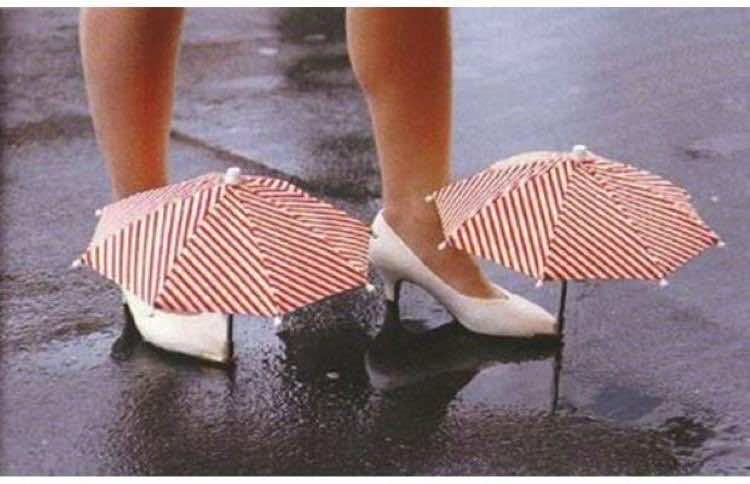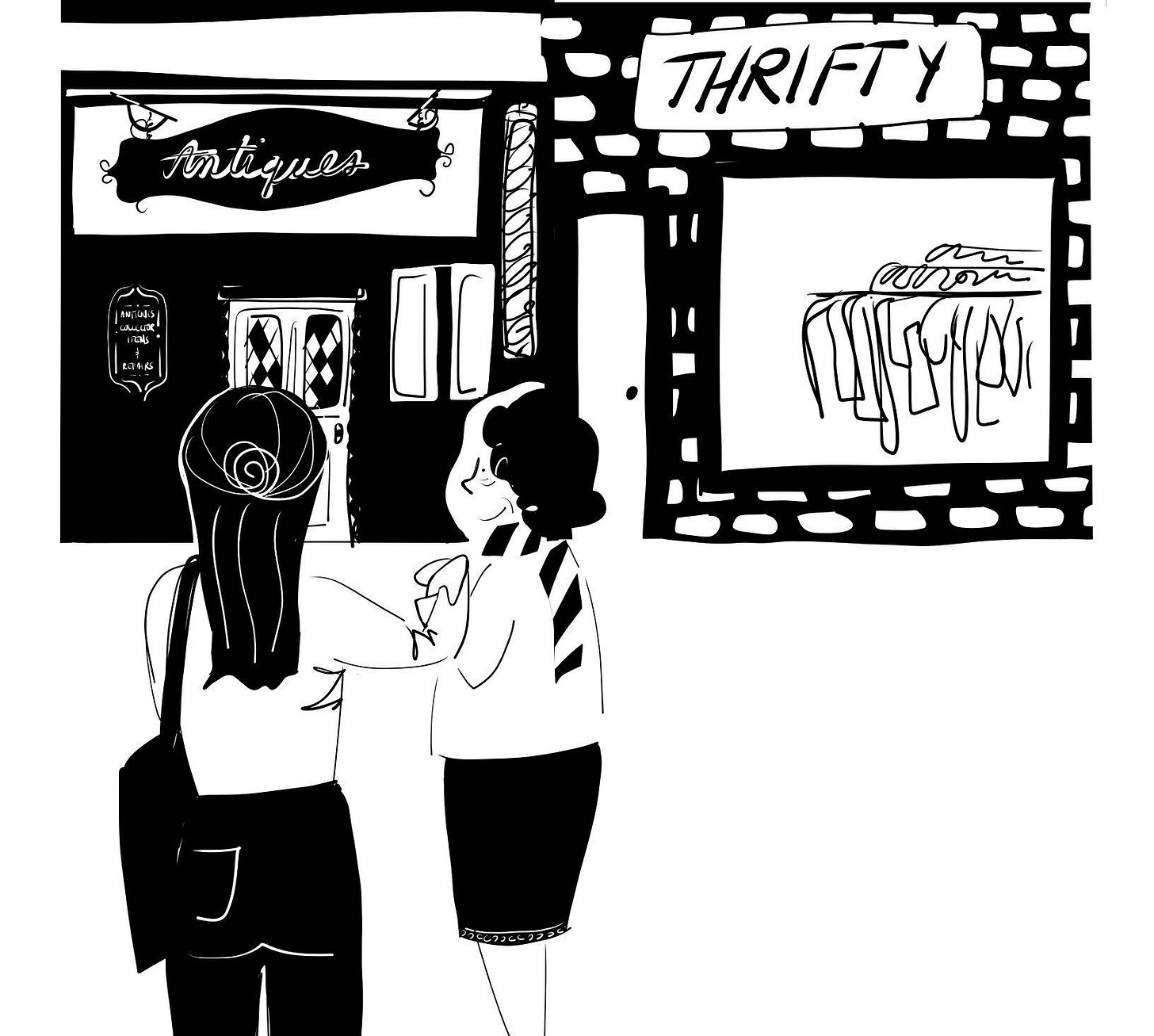As the year comes to a close, I’m reminded of a considerable challenge in practicing environmentalist values: expectations around gift-giving. The holiday season is traditionally a time of great abundance. As such, it’s easy to make excuses for indulgent consumerism, even for those of us who usually aim to do better. That’s why I’m delighted to share this op-ed from contributor Hannah Bercovici, who offers a slew of ideas for low-impact gifts. Now that’s a kind of excess I can get behind. Wishing you and yours a very happy holiday season.
—Brendan Loudermilk, Founder of Climatescape
Gift Like An Environmentalist
Corporations emit far more emissions and have a much larger impact on the environment than all consumers combined. As an individual person, that can feel incredibly overwhelming.
But remember, individuals do have power—and that power is choice. We can choose what companies we buy from, or if we even buy at all. We can choose to think about gifts as resources consumed, the same resources future generations need to prosper. The holiday season, more than any other time of the year, is full of choices we can make to stop using the planet’s resources for unnecessary consumption.
There are plenty of articles out there to tell you where to buy the top 100 “eco-friendly” gifts. Trust me, I have done my own deep dives into this particular topic countless times trying to make myself feel better. For example, did you know they make a toilet brush made out of boar whiskers and bamboo? Well, I didn’t until I bought one! And it… It does the job.
Unfortunately, buying anything with the climate crisis in mind requires lots of moral reckoning. This often becomes so exhausting that the emotional and financial damage can be unredeemable.
Let’s consider some real ways to reduce our impact while still expressing our love and care for the people in our lives—and for those who have yet to be born.
Don’t Buy Stuff!
Both the most obvious and difficult to do, one way to lessen your impact on the planet is to not buy anything at all. When people buy products from companies, that tells said companies we want their products, even if they’re useless. They then will produce more of those products, requiring more resources, which results more often than not in sketchy practices… You get the idea.
The supply chain is a mess. The more you can step out of it, the better.
Unfortunately, this is the time of year that people love to buy each other the newest gadgets and gizmos. It has become a symbol of love in our society to give each other shiny new things. Luckily, there are ways around this desire that don’t involve you getting involved with the supply chain.
Buy Nothing, Exchange Everything
The “Buy Nothing” movement is increasing in popularity in the face of inflation, climate change, and excess waste. The project was founded in 2013, and as of 2021, there are over 7,000 Buy Nothing communities active world-wide in about 44 countries. Odds are that you probably live near one of these communities, which can typically be found through social media.
So instead of buying a new gift, you can choose to trade stuff with other people. Get together with neighbors and friends to find gifts your loved ones might like, often for free.
For example, the Buy Nothing group in Tempe, Arizona in the U.S. recently hosted a Buy Nothing Gifting Fair. People from all around the neighborhood brought gift-worthy things to trade with others. Not only does it provide the opportunity to connect with neighbors, but also helps you find gifts at no cost.
You can also give your loved ones stuff that you no longer use but they might like. For example, when I’m done with a book, I will often give it to a friend as a gift. As a result, my house is less cluttered and I have an automatic future conversation topic when we discuss the delicious intricacies of a well-told story.
And here’s another great idea a friend has planned for our friend group: Do a gift exchange, like Secret Santa, and only gift what you already own. As you theoretically want the present to be meaningful, fun, and thoughtful, you’ll likely give your friend something you care about, often with an entertaining story behind it.
Gift An Experience
Time and attention are our scarcest resources. Life is busy and spending time with one another is a gift, especially for those we don’t see often. Give the gift of time this year! For example, you could go for a walk with your grandparents in their favorite park, or have a video chat dinner together where you make the same meal.
You can also buy an experience for your loved ones. “The happiness we get from an experience, like a day hiking on a mountain, using the service of a cable car, lasts much longer than the kick we get out of a material purchase,” said Niko Stoifberg in his TEDx talk about his Buy Nothing year.

For example, instead of buying your father-in-law a new mug he’ll never use, you could sign you both up for a pottery class. Not only does that create a bonding experience, but it also shows that you care and want to spend time with that other person.
Create Gifts
Another meaningful way to give a gift is by making it. In fact, if you lived in Ancient Rome, giving each other handmade gifts was the norm! Whether you’re a professional artist or a novice, people will (usually) appreciate a handmade present.
For a classic example, let’s say you’re taking that pottery class you bought for you and your father-in-law. Now, you both have a bunch of homemade mugs—what great gifts for birthdays and the holidays!
Donate as a Gift
If you and your loved ones figure out that none of you really need anything, use the money you would have spent on gifts and donate to a climate cause. We know there are many that would appreciate a donation. You could all decide to donate money in each other’s names to non-profit organizations, buy them a subscription to a climate-oriented publication, plant a tree in their name, offset each other’s carbon, or whatever you want!
Buy Old
Did you know that fast fashion is the world’s second largest polluter after the oil & gas industry? In fact, the global clothing supply cycle releases the equivalent of 3.3 billion tons of CO2 a year, significantly more than international flights and maritime shipping combined.
If you feel the need to buy gifts for the holidays, buying used is a planet-friendly option. According to a 2017 report by the American Apparel Association, buying second-hand reduces one's water consumption, waste, and carbon footprint by more than 80%. Buying used objects doesn’t require any new resources because it already exists outside of the demand of our modern economy. You can buy tons of used stuff that looks and feels new (and often is due to impulse buying).
Things to Consider When Buying New
Maybe you read the above and thought to yourself, “No, I have to buy new, shiny gifts for my people.” Fair enough. In the case you still feel like you should get something new for your loved ones this holiday season, consider incorporating the following into your gifting routine:
Check in with your loved ones
Instead of randomly buying things that you think friends and family might like, take the mystery out of the equation and ask them for what they actually need. When you do that, make sure to buy something high quality so that they’ll be able to use it for years to come, rather than having to replace it year after year (like my mother and computers, apparently).
Buy local
When you can, try to buy from local artists and shops—especially those that make their products nearby. Buying local reduces the amount of carbon emitted from transporting goods and also supports your community! Check out the neighborhood art fair or farmer’s market to see if you can find something good for gifting. And always ask where the products are made, just in case.
Go with proven climate-friendly consumption
Give the gift of a low environmental footprint. Think about what changes you have made to lower your own environmental impact (like buying a non-plastic toilet brush). Use your own experience as a thoughtful consumer to introduce people to your favorite low-impact brands. If you can convince three other people to make a change that you have also made, you’ve helped to reduce their footprint. Social pressure has been found to be highly effective for increasing people’s sustainable actions.
For example, maybe you’ve chosen to start gardening in your backyard to improve your carbon footprint. You can buy or give away seeds/seedlings for people to grow their own food—maybe even gift them some eco-friendly gardening equipment to help them get started. Plus, you can help them set up a garden while spending quality time together. Win, win, win!
The Impact of Gifting on the Future
The prosperity of our current age is truly mind-boggling. Never before have we been able to buy stuff at such an astounding rate. Holidays expedite this phenomenon, creating a culture of buying for quantity rather than quality or meaning.
In ancient times, people would give gifts to amuse each other or honor the gods, like with homemade figurines or dice. Obviously gifting has evolved significantly since then. In fact, the custom of buying one another extravagant gifts comes from 16th century workers requiring their local elites to provide them benefaction for all their work during the warmer seasons. So maybe Jeff Bezos could “gift” the go-ahead for Amazon workers to unionize next year.
How we gift now affects the future in many ways, both known and unknown. What we do know is that every moment of meaningless consumption uses resources future generations need. In fact, according to Kurzgesagt, countless generations of humans are waiting to be born, even in the worst climate scenarios. What kind of gifting do we want future humans to enjoy that best sets them up for success?
We need a balance. Overconsumption is a part of our modern society, despite knowing that impulse or excess purchasing is unhealthy for all involved, from planet to people. The answer must involve reducing our impact, which includes actions from not buying to buying high quality, local products. This is where our power lies—the choice of how and whether to consume.
What choice will you make this holiday season?
Recommended Further Resources
📰 'Buy Nothing' Groups: Stop Spending Money And Just Ask For What You Need from the Huffington Post
📺 Stop Buying Stuff by Niko Stoifberg for a TEDx talk
🎓 The climate-friendly gift guide for every level of motivation from Grist
🎧 Fast Fashion's Dirty Little Secret (Hint: It's Oil) from How to Save a Planet
Did you like this article? Please subscribe and share so that we can keep writing pieces like this for your enjoyment and enrichment.
You can also see our other pieces on geothermal energy, lithium-ion batteries, Indigenous land sovereignty, and more by clicking the button below.







